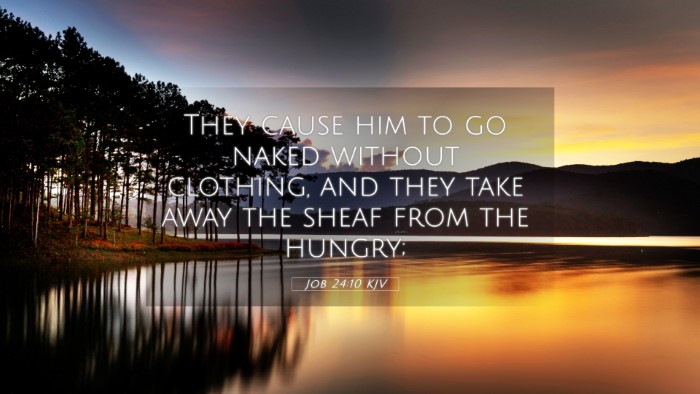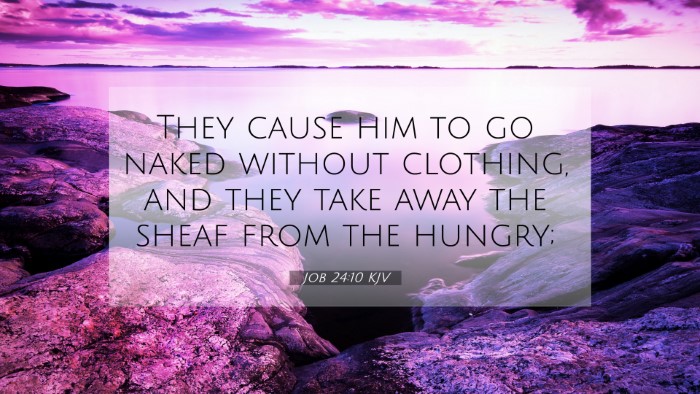Old Testament
Genesis Exodus Leviticus Numbers Deuteronomy Joshua Judges Ruth 1 Samuel 2 Samuel 1 Kings 2 Kings 1 Chronicles 2 Chronicles Ezra Nehemiah Esther Job Psalms Proverbs Ecclesiastes Song of Solomon Isaiah Jeremiah Lamentations Ezekiel Daniel Hosea Joel Amos Obadiah Jonah Micah Nahum Habakkuk Zephaniah Haggai Zechariah MalachiJob 24:10 Similar Verses
Job 24:10 Cross References
They cause him to go naked without clothing, and they take away the sheaf from the hungry;
Uncover the Rich Themes and Topics of This Bible Verse
Listed below are the Bible themes associated with Job 24:10. We invite you to explore each theme to gain deeper insights into the Scriptures.
Job 24:10 Cross Reference Verses
This section features a detailed cross-reference designed to enrich your understanding of the Scriptures. Below, you will find carefully selected verses that echo the themes and teachings related to Job 24:10 KJV. Click on any image to explore detailed analyses of related Bible verses and uncover deeper theological insights.
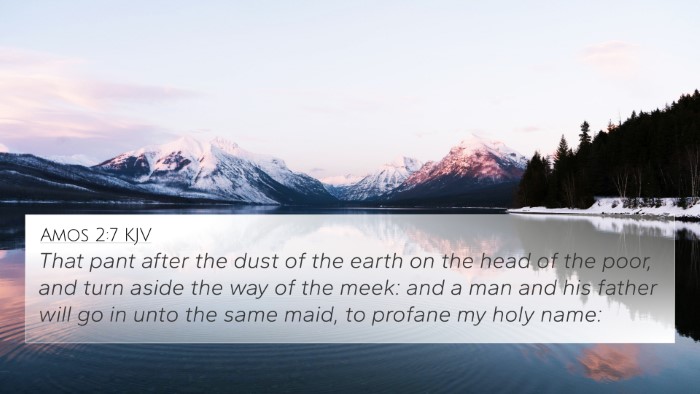
Amos 2:7 (KJV) »
That pant after the dust of the earth on the head of the poor, and turn aside the way of the meek: and a man and his father will go in unto the same maid, to profane my holy name:
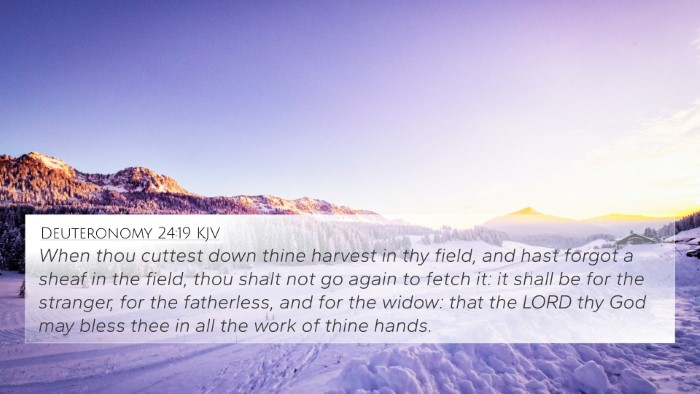
Deuteronomy 24:19 (KJV) »
When thou cuttest down thine harvest in thy field, and hast forgot a sheaf in the field, thou shalt not go again to fetch it: it shall be for the stranger, for the fatherless, and for the widow: that the LORD thy God may bless thee in all the work of thine hands.
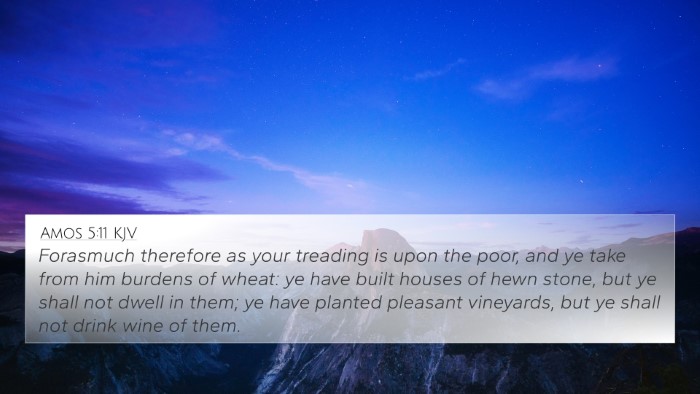
Amos 5:11 (KJV) »
Forasmuch therefore as your treading is upon the poor, and ye take from him burdens of wheat: ye have built houses of hewn stone, but ye shall not dwell in them; ye have planted pleasant vineyards, but ye shall not drink wine of them.
Job 24:10 Verse Analysis and Similar Verses
Understanding Job 24:10
Job 24:10 states: “They cause him to go naked without clothing, and they take away the sheaf from the hungry.” This verse encapsulates the plight of the oppressed and the injustices faced by those in desperate circumstances. Job, in his discourse, questions the presence of such injustices, emphasizing both human suffering and the moral failings of society.
Commentary Insights
-
Matthew Henry:
Henry notes that this verse highlights the cruelty of those who take advantage of the vulnerable. The imagery of stripping the naked suggests a complete lack of compassion, and it portrays the brutality of human greed and neglect towards the helpless.
-
Albert Barnes:
Barnes emphasizes the thematic linkage between the act of taking away a person's clothing and the broader idea of depriving them of their dignity and sustenance. He explains that the sheaf refers to the measure of food needed for survival and that withholding it represents a profound moral failing in society.
-
Adam Clarke:
Clarke discusses the implications of such actions, interpreting them as a reflection of humanity’s wickedness. He sees the nakedness as a metaphor for the spiritual state of man without God’s provision, paralleling the physical suffering that accompanies social injustice. Clarke also highlights the scriptural principle that underpins the command to care for the needy.
Key Themes and Interpretations
This verse speaks on several key themes within the larger narrative of the Book of Job, including:
- Human Suffering: Job illustrates the harsh realities of human pain and the seeming silence of God in the face of suffering.
- Social Injustice: The actions described serve as examples of a broader critique against societal neglect and the moral responsibility to care for the impoverished.
- The Nature of God: Questions arise about divine justice when the wicked prosper while the righteous suffer.
- Divine Sovereignty: Despite the darkness of the circumstances, the Job narrative ultimately leads to a revelation of God's sovereign purpose.
Related Bible Cross References
Several passages within the Scriptures resonate with the themes presented in Job 24:10. These inter-Biblical dialogues help to contextualize Job's situation and the universal truths regarding suffering and justice:
- Matthew 25:35-40: Emphasizes caring for those in need as service to Christ himself.
- James 1:27: Defines pure religion as caring for orphans and widows, directly linking to Job's concerns for the destitute.
- Isaiah 58:7: Calls for sharing one's bread with the hungry and providing shelter to the homeless.
- Proverbs 22:22-23: Warns against robbing the poor, asserting that God will plead their cause.
- Luke 6:20-21: Declares blessings upon the poor and those who hunger, underscoring God's concern for the marginalized.
- Exodus 22:25-27: Instruction on lending to the poor without interest and returning their clothing by sunset.
- Psalms 109:10: Speaks to the fate of the wicked who oppress the poor and needy.
- Micah 6:8: Speaks to what God requires: doing justice, loving kindness, and walking humbly with Him.
- 1 John 3:17: Addresses the believer's responsibility toward those in need.
- Proverbs 14:31: Mentions that helping the poor honors God, while neglecting them is an offense to Him.
Connections Between Bible Verses
As we explore the connections between these verses, we recognize a recurring theme of divine justice and human accountability:
- Overall Message: The Scriptures collectively urge believers to act justly and compassionately, mirroring the teachings found in Job’s experience.
- Thematic Links: Themes of suffering, social injustice, and divine sovereignty are found throughout the Bible, encouraging deeper study and understanding of these interconnected ideas.
- Comparative Analysis: Examining these verses in concert with Job 24:10 reveals God's consistent call for justice and the moral obligations of His people.
Tools for Bible Cross-Referencing
To facilitate deeper understanding, utilizing tools for cross-referencing can enhance Bible study:
- Bible Concordance: A valuable resource for locating specific verses and exploring related themes.
- Bible Cross-Reference Guide: Provides a systematic approach to linking verses and uncovering thematic connections.
- Cross-Reference Bible Study Methods: Techniques that help delve into the nuances of Scripture through comparative analysis.
- Bible Reference Resources: Handy tools that aid in exploring verses related to sermon preparation and thematic studies.
Conclusion
Job 24:10 serves as a profound reminder of the moral failures present in humanity and the responsibility that we bear toward others, particularly the vulnerable. Understanding this verse not only calls for introspection but also invites us to engage with the broader Scriptural mandate concerning justice and compassion.
As we pursue a deeper relationship with God through Scripture, recognizing these themes allows us to reflect on our own roles within society and the need for a commitment to uphold justice and mercy in our lives.

